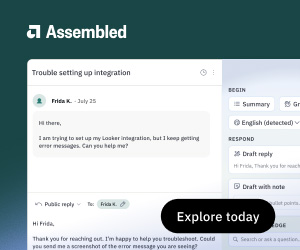For call centre agents, talking to strangers is an essential part of the job.
When you spend most of your time speaking to people you’ve never met before, you need to be a strong communicator.
This means not only delivering a clear message but listening to the customer and hearing their side of the story.
If you want to bring your customer experience to the next level and deliver truly exceptional service, you need to focus on these eight crucial communication skills.
Why Are Strong Communication Skills Essential for Your Call Centre Success?
To work effectively with others, co-workers and customers, you need to cultivate emotional intelligence and hone your soft skills.
While soft skills like flexibility and problem solving are important, research has found that communication is the most in-demand soft skill in 2023. Strong communication skills allow agents to quickly resolve queries, leading to improved metrics, better CX, and higher customer satisfaction scores.
Failure to prioritize communication could negatively impact service, leading to a weakened brand image, poor reviews, and, ultimately, lower revenue.
With nearly half of the businesses having lost a customer due to poor communication, failure to train agents in this area can be costly.
How to Train and Foster Strong Communication Skills
78 percent of employees believe that communication should be a higher priority in their organization. With this in mind, getting agents to up their communication skills shouldn’t be overly challenging.
The important thing is that you identify which communication skills are important to your call centre and take the proper steps to train your agents in these areas.
By setting clear goals and blending learning approaches, you can build a call centre full of strong communicators.
Consider Nature vs. Nurture
While soft skills are often regarded as inherent traits linked to personality, this isn’t entirely true. Some people may be better suited to certain forms of communication, but everyone can become better at expressing themselves.
The communication skills we will discuss in this article are relevant to introverts, extroverts, and everyone in between.
While introverts may prefer text-based mediums like chat and email, whereas extroverts could favor phone and video, everyone can benefit from this kind of training.
Assess Skill Gaps
To effectively coach your agents, you first need to evaluate their existing skills. Using tools like scorecards, you can determine where communication skills are lacking and deliver targeted training to address these gaps.
Blanket approaches can be a waste of resources. It’s better to provide agents with individually-tailored plans and address clearly identified skill gaps.
Develop Dedicated Training Programs
Targeted training gets quicker results, keeps agents more engaged, and ensures that you’re using your time effectively.
Updating learning materials on a regular basis keeps things fresh, and bringing in external speakers adds new knowledge to your organization.
Be sure to regularly review these programs and analyze their effectiveness. Your training programs should also include a collaborative element, with agent feedback informing your approach.
Use Role-Playing Exercises
Nothing beats hands-on experience, but role-playing exercises are the next best thing. Training methods that involve the use of common scenarios increase agent competency and equip them with extensive knowledge of the challenges they will face in the call centre.
Make sure to incorporate call centre quality assurance software as part of these exercises, as this will best replicate real-life agent-customer interactions.
Support New Hires
By establishing the importance of strong communication skills in the onboarding process, you can encourage new hires to grow in the direction that will benefit them moving forward.
Make soft skills training part of onboarding, encourage new hires to reach out for support, schedule regular one-on-ones to see how they’re getting on, or even create a mentoring system that helps new recruits settle in.
Deliver Regular Feedback and Coaching
Regular feedback is a key aspect of any successful training program and needs to come from both directions, from supervisors to agents and vice versa.
A back-and-forth feedback dynamic will encourage improvement on both sides, facilitating agent growth and helping to refine training approaches.
Run Communication Skills Workshops
Running workshops from time to time can break up the typical training flow and inject new energy. With workshops, you can quickly get your team up to speed on a specific skill.
For example, a day-long crash course in handling difficult customers may see improvements in conflict resolution faster than a series of small sessions.
You could also consider bringing in external experts to run these workshops, as the outside expertise could have a greater impact on agents than another coaching session with their manager.
Essential Communication Skills for Call Centre Agents
An effective communicator needs to develop a diverse skill set. While many of these skills are interconnected, it’s important to target them individually in the training process.
Below, we will discuss some of the most important communication skills for a call centre agent. You can also use this list of essential communication skills as a checklist during the recruitment process.
Clarity
Clarity is all about communicating in a clear and concise manner, using easily understandable, conversational language.
Benefits: Clarity allows for more productive conversations, quicker resolutions, and, when it comes down to it, happier customers. This results in stronger scores for key metrics like first call resolution, as well as improvements in CSAT, NPS, and other KPIs.
How to Train: Run practice scenarios for agents using call recording software and review them after the mock call. Did they keep their language clear and understandable? Was there room for misinterpretation? By reviewing and practicing these scenarios, you can get agents into the habit of communicating clearly.
Authenticity
Authenticity is about honest engagement. Customers want a real conversation; they don’t want an agent reading from a script.
Benefits: Carrying out authentic conversations will help build relationships and make for a much stronger customer experience. People appreciate real, human interactions, with 82 percent of customers more likely to show loyalty to a brand that allows agents to go off script when resolving their issues.
How to Train: Strong product knowledge will allow agents to resolve issues without sticking too rigidly to the script. Informed agents can solve any problem, no matter how unique, without resorting to a template answer.
Active Listening
The ability to really listen to customers is one of the most important communication skills you can develop in your agents.
Benefits: Active listening helps customers to feel heard, building trust and creating an open dialogue so both parties can engage in a productive conversation.
How to Train: Coach agents in active listening and remind them of what to do and what not to do. Interrupting the customer, getting defensive, and assuming you know the answer are all common mistakes. Instead, give the customer a chance to speak, listen carefully, and take your time before responding.
Mirroring
Mirroring is about matching the tone and language of the customer and, in the case of video calls, their body language and expressions.
Benefits: By mirroring the customer, you highlight the fact that you are paying attention to their concerns. This helps build a more trusting relationship and leaves the customer with the feeling that they have been heard.
How to Train: Again, practice makes perfect. Agents must understand how to mirror different kinds of customers and, as in the case of an angry customer, when mirroring is a bad idea. Try repeating phrases the customer has used, matching the pace of their speech, and summarizing their issues to show that you were listening.
Probing Questions
Insightful questioning is important for gathering the necessary information and getting to a resolution in a swift, effective manner.
Benefits: Used correctly, probing questions can encourage the customer to get to the heart of their problem while keeping them engaged and communicative. This facilitates a quick resolution and shows the customer that you’re interested in helping them.
How to Train: Teach your agents how to ask insightful questions and gather information quickly. One training exercise involves drawing a picture and getting an agent to replicate the image without seeing it. The agent must discern what the image is using only probing questions. Afterward, you can review the questions to see which ones were useful and which weren’t.
Empathy
Empathy is the ability to step into another person’s shoes and understand where they’re coming from. In the people-focused call centre environment, this is a vital communication skill.
Benefits: Empathy facilitates positive connections, increasing customer satisfaction and encouraging loyalty. Empathetic agents are better at building relationships, helping decrease churn and increase a customer’s lifetime value.
How to Train: Encourage your agents to reflect on difficult customers they have had and consider why the customer may have been difficult to deal with. If they can understand what challenges led that customer to become disagreeable, they can use it in future interactions. It’s all about listening and being open.
Conflict Resolution
Conflict resolution is about turning a negative situation into a positive one.
Benefits: By resolving a difficult situation amicably and professionally, you may be able to strengthen the relationship, boost customer loyalty, and improve your reputation.
How to Train: Agents need to learn to be calm and patient, offer the customer options, and, most importantly, remember not to take anything personally. Remind agents to remain positive and note possible approaches that could work for future conflicts.
Adaptability
While there are common call centre scenarios that you can prepare for, agents must always expect the unexpected.
Benefits: Adaptable agents can handle any customer request, no matter how unique, guaranteeing a quick, efficient resolution. This maintains high service levels and ensures customers leave with a positive feeling.
How to Train: Develop strong service fundamentals and detailed product knowledge to ensure the foundations for query resolution are in place. Flexibility in dealing with different kinds of customers and scenarios can be achieved with varied role-playing exercises and unexpected requests.
Final Thoughts
In the call centre industry, communication is king. To elevate the customer experience and maintain strong scores for CSAT, NPS, and other service metrics, you must make communication skills a central part of your agent training program.
Using tools like scorecards and AI analytics, you can identify skill gaps and deliver tailored training to address them.
This blog post has been re-published by kind permission of Scorebuddy – View the Original Article
For more information about Scorebuddy - visit the Scorebuddy Website
Call Centre Helper is not responsible for the content of these guest blog posts. The opinions expressed in this article are those of the author, and do not necessarily reflect those of Call Centre Helper.
Author: Scorebuddy
Published On: 2nd Feb 2023
Read more about - Guest Blogs, Scorebuddy






 Scorebuddy is quality assurance solution for scoring customer service calls, emails and web chat. It is a dedicated, stand-alone staff scoring system based in the cloud, requiring no integration.
Scorebuddy is quality assurance solution for scoring customer service calls, emails and web chat. It is a dedicated, stand-alone staff scoring system based in the cloud, requiring no integration. 































